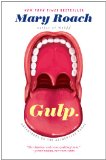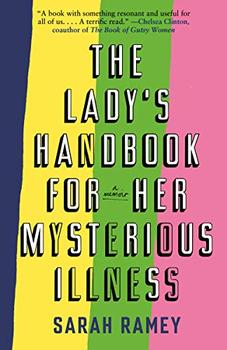Summary | Excerpt | Reviews | Beyond the book | Read-Alikes | Genres & Themes | Author Bio

Adventures on the Alimentary Canal
by Mary RoachMary Roach has found her stride. "The food chute is mine," she declares in the introductory chapter to Gulp. A part of me wonders if some of her childlike glee is because with Gulp, she has pinpointed a subject (the digestive system) that lends itself so easily to humor. In the past, her books Spook and Stiff treaded on morbid ground, while Bonk was saucy and scandalous. Gulp, however, with its singular focus on the ins and outs of the digestive tract, is Roach's opportunity to indulge in high-brow scatological humor and dive into research about methane, chewing, and laxatives.
Gulp is the kind of book that is worth reading in the company of others so that the many bizarre and fascinating facts that Roach has squished together can be easily shared. Roach approaches the entire digestive system with awe and an insatiable amount of curiosity, which results in cheeky jokes, puns, and stylishly digressive footnotes. Whether she's writing about Elvis Presley's megacolon or the stock images that are used in flatulence advertisements, she's always moving in a direction towards explaining or exploring her subject from another angle. Part of the pleasure of the book, which I realized somewhere around the chapter on overeating, is simply having Roach as the guide on this stinky, spongy adventure.
Roach is at her best in the middle and latter half of the book. The beginning, with an olive oil tasting and a lengthy explanation of why organ meats are superior to muscle meats, is too common, too close to half-hearted food writing, to create Roach's trademark well-researched oddities. Roach's energy for wacky journalism and quirky facts begins to glow when she reaches the weirder regions along the alimentary canal: the esophagus, stomach, and everything beyond. As a former academic, this well-researched weirdness is what I love about Roach's writing. She avoids the A.J. Jacobs-style schtick of taking on massive self-experiments or lapsing, as many science writers do, into dry, jargon-laden territory. Instead, Roach focuses trying to answer the questions about bodily functions that are often asked but rarely explored: Can you eat yourself to death? Can intestinal gas odor be truly lethal? Is it possible to survive being swallowed alive?
It takes a special person to go into university science labs and agricultural departments and find material that is amusing to a mass audience. The moments when Roach drops into narrative, bringing the reader along through a lab or research center, are some of the many highlights of the book. Oftentimes, meeting the academics, researchers and scientists behind the facts is even more amusing than the facts themselves. Like the "saliva scientist" who revels in the beauty of the viscous fluid, each brightens the story with a quirky personality and one-liners. Roach portrays these researchers with the same factual perkiness as her explorations of the curious parts of one's gut. When she pauses to chitchat and observe the people who dedicate their lives to studying saliva and feces, her writing goes from a factual compendium to a complete narrative. In these moments it is truly a story of one writer's trip down the alimentary canal, rather than a scientist's analysis of it.
For those who have not read Mary Roach books before, Gulp is a great place to start. In her signature style, she has framed her singular subject with humor, unwavering curiosity, offbeat research and quirky facts. Her dry wit, approachable tone, and careful dollops of academic research make for a book that feels familiar, but also startlingly fresh and innovative.
![]() This review was originally published in The BookBrowse Review in May 2013, and has been updated for the
April 2014 edition.
Click here to go to this issue.
This review was originally published in The BookBrowse Review in May 2013, and has been updated for the
April 2014 edition.
Click here to go to this issue.

If you liked Gulp, try these:

The Salmon Cannon and the Levitating Frog
by Carly Anne York
Published 2025
A brilliant new voice in science writing—"witty, whip-smart, truly one of our best" (Mary Roach)—shows why playfulness and curiosity are the key to science.

The Lady's Handbook for Her Mysterious Illness
by Sarah Ramey
Published 2021
The darkly funny memoir of Sarah Ramey's years-long battle with a mysterious illness that doctors thought was all in her head - but wasn't. A revelation and an inspiration for millions of women whose legitimate health complaints are ignored.
Your guide toexceptional books
BookBrowse seeks out and recommends the best in contemporary fiction and nonfiction—books that not only engage and entertain but also deepen our understanding of ourselves and the world around us.